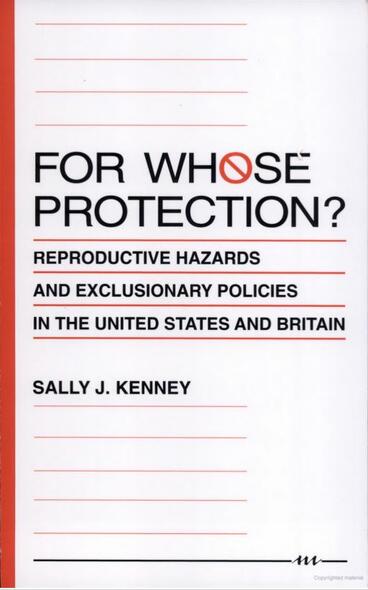For Whose Protection?
Reproductive Hazards and Exclusionary Policies in the United States and Britain
Probes the complex issues that underlie policies regarding women's reproduction and the workplace
Description
Do employers have the right to exclude women of childbearing age from certain jobs? For the past three decades, courts in the United States and Britain have wrestled with the question of whether so-called fetal protection policies actually constitute sex discrimination in employment. In the closely followed United Auto Workers v. Johnson Controls case, the United States Supreme Court ruled against a battery manufacturer’s policy of excluding women of childbearing age from certain jobs involving hazardous substances.
In For Whose Protection? Sally Kenny places current exclusionary policies in the historical context of protective legislation, exploring how prevailing perceptions about sex differences have been used to exclude women from jobs. She analyzes a number of sex discrimination cases brought against employers both in Britain and the United States. Drawing on interviews with activists, parties to litigation, lawyers, and governmental officials as well as traditional analyses of legal canons and legislative history, her study considers important moral, legal and public policy questions in the context of real women’s lives.
Reviews
“An important and timely book . . . rich in factual details and reflections on their significance in the development of law and policy. It will be an essential resource for scholars and will engage, enlighten, and stimulate other readers who are interested in women’s rights and women’s roles.”
--Joan Bertin, American Civil Liberties Union
“Original . . . there has been no comprehensively systematic treatment of this issue. The book’s thoroughly comparative approach makes it a worthwhile contribution to the general field of comparative political and legal studies.”
--Elizabeth Meehan, The Queen’s University of Belfast
“A highly readable and intelligent feminist critique of one of the most important yet least publicized aspects of women’s reproductive rights. . . . Kenney unmasks the ‘gendered thinking’ behind so-called fetal protection policies and their pseudo-scientific rationales.”
--Rosalind Petchesky, Hunter College
“. . . reveals the problematic nature of both the concept of sex discrimination and the assumptions about equality that are embedded in the laws of both Britain and the United States. . . . Kenney’s book is essential reading for scholars in women’s studies, comparative politics, and legal studies.”
--Susan J. Carroll, Rutgers University
News, Reviews, Interviews
Review Law and Politics Book Review | 10/1/1993

